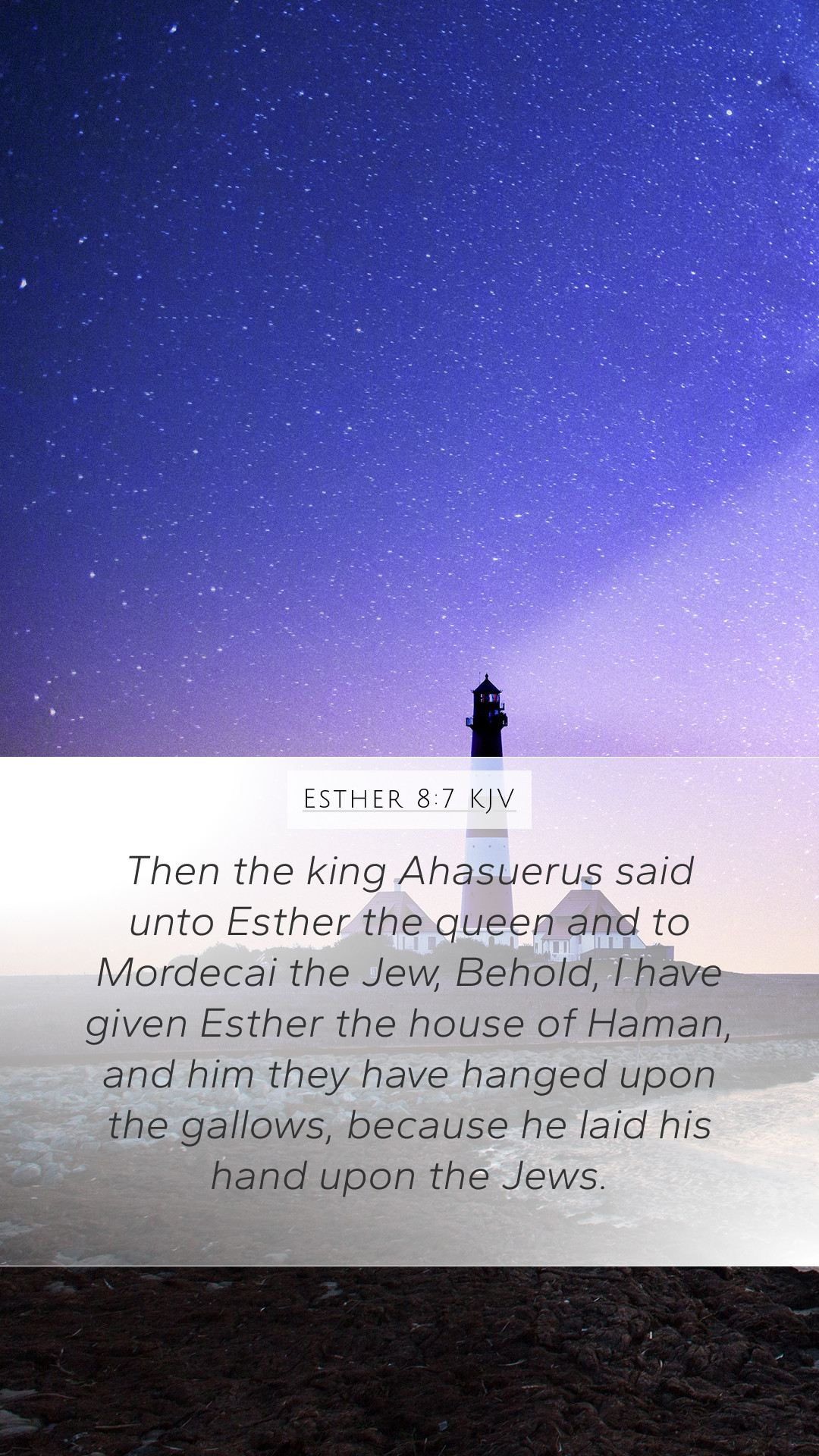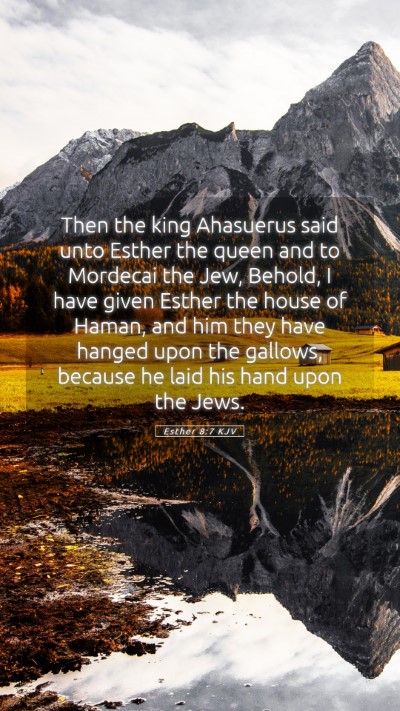Old Testament
Genesis Exodus Leviticus Numbers Deuteronomy Joshua Judges Ruth 1 Samuel 2 Samuel 1 Kings 2 Kings 1 Chronicles 2 Chronicles Ezra Nehemiah Esther Job Psalms Proverbs Ecclesiastes Song of Solomon Isaiah Jeremiah Lamentations Ezekiel Daniel Hosea Joel Amos Obadiah Jonah Micah Nahum Habakkuk Zephaniah Haggai Zechariah MalachiEsther 8:7 Meaning
What is the meaning of Esther 8:7?
Then the king Ahasuerus said unto Esther the queen and to Mordecai the Jew, Behold, I have given Esther the house of Haman, and him they have hanged upon the gallows, because he laid his hand upon the Jews.
Esther 8:7 Bible Verse Meaning
Understanding Esther 8:7 - Bible Verse Commentary
Esther 8:7 states:
"Then the king Ahasuerus said unto Esther the queen, and to Mordecai the Jew, Behold, I have given Esther the house of Haman, and him they have hanged upon the gallows, because he laid his hand upon the Jews."
Overview of the Verse
Esther 8:7 captures a pivotal moment in the narrative of Esther, revealing the king's declaration regarding the fate of Haman and the protection granted to the Jewish people. This verse signifies a turning point in the story, where justice prevails, and the Jewish people's plight is addressed.
Historical Context
In the book of Esther, historically set in the Persian Empire, the Jewish people faced a dire threat from Haman, who sought their extermination. Esther, a Jewish queen, intercedes on behalf of her people, leading to a series of events culminating in this decree from King Ahasuerus (Xerxes I). The significance of this verse extends beyond the immediate narrative, reflecting God's providence in safeguarding His people.
Key Insights from Public Domain Commentaries
Matthew Henry's Commentary
Matthew Henry emphasizes the contrast between Haman's demise and the elevation of Esther and Mordecai. He notes that God's judgment against Haman serves to highlight His care for the Jewish people. Henry elaborates that such events demonstrate God's sovereignty and the eventual victory of good over evil.
Albert Barnes' Commentary
Albert Barnes focuses on the implications of the king's decree, describing how the fall of Haman established a new order that allows the Jews to defend themselves. Barnes points out that this moment illustrates the fulfillment of God's promise to protect His chosen people, encouraging believers to trust in divine justice.
Adam Clarke's Commentary
Adam Clarke offers a detailed examination of the king's authority in this matter, analyzing how the political landscape of Persia allowed for such dramatic shifts. He underscores the significance of the hanged Haman as a public display of justice, which serves to rally the Jewish community and restore their hope.
Spiritual Significance
Esther 8:7 reflects themes of justice, redemption, and providence. It manifests the profound belief that God intervenes in human affairs, often through unexpected means. The Jewish people's deliverance is seen as a foreshadowing of greater deliverance through Christ, marking a crucial aspect of Bible verse meanings applicable to faith today.
Application of the Verse
When considering Esther 8:7, believers are reminded to trust God's timing and justice, even in seemingly bleak circumstances. The historical context and narrative resolution encourage individuals to pursue righteousness and remain steadfast in faith, affirming the value of standing up for truth.
Cross References
- Esther 3:2 - Haman's decree against the Jews.
- Esther 7:10 - The judgment of Haman.
- Psalm 37:10-11 - Assurance of the righteous receiving inheritance.
- Proverbs 11:21 - The fate of the wicked.
- Romans 8:28 - God's work for the good of those who love Him.
In-Depth Bible Study Insights
For those exploring Bible study topics related to Esther 8:7, consider discussing the attributes of God displayed in this narrative—His justice, mercy, and ultimate authority. Groups can use this verse to delve into understanding Scripture as it pertains to the faithfulness of God amid trials.
Conclusion
Esther 8:7 not only narrates a key historical moment but also serves as a reminder of God’s overarching plan for His people. Through the combined insights of various commentaries, we gain a richer, deeper understanding of the significance of this verse and how it may be applied to our lives today.


